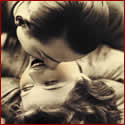|
Hay
Fever by
Noel Coward |
 |
|
|
Things are certainly feverish at the Playhouse this week as Hay Fever carries out its dizzying run. Twenty-four hours in the company of the Bliss family, the main protagonists of this Coward farce, is an exhausting and confusing thing. Husband and Wife Judith and Richard and their children Sorel and Simon are a theatrical family, not just because Judith is a retired stage actress of some note, but also because they seem to 'perform' their lives, regardless of whether they have an audience or not. The fact that the outrageous behaviour of the family is based on a couple that Noel Coward knew makes the mind boggle! Four hapless and unprepared guests arrive, invited by different members of the family, to stay at the Bliss's house for a weekend that they will never forget. We discover that Simon has invited Myra, an acquaintance of the family, and not a particularly popular one at that. Judith has invited Richard, a diplomat, in an attempt to prove to her family that she sees it as shallow and amoral, and is serious about putting these faults in herself right. And Judith has invited Sandy Tyrell, a young and admiring fan she had met the previous week. Instead of arguments about mothers having lovers, and daughters seeing older men, the main bone of contention is which of the guests gets the 'Japanese Room'. The father of the family, drawn from writing his novel by the noise, fails to bring the calm and reason so needed - but adds to the chaos of the conversation by explaining that the Japanese room is already reserved, for his guest Jackie Coryton, a Flapper that he has also met just a few days before. And so competition for attention begins and the farce unfolds and the guests are used and abused in the battle. An attempt at normality, a parlour game turns into a full-blown family row - the already excitable Simon becomes apoplectic as the game falls apart and various members of the family storm off in disgust, selecting a guest to take with them. Not the guests they invited, I hasten to add. The family are played to full effect and beautifully. Simon Quarterman is particularly effusive, loud and passionate as the hyperactive Simon. The contrast with the guests is stark, and watching their reactions as they are thrown into this environment is the most entertaining part of the play. After Sorel ditches Richard for Sandy (there is a terrific moment of slapstick as Sandy tries to put his trousers back on after the two are caught in the act), the young man watches in bewilderment as Judith 'gives' him to her daughter, emotionally granting her blessing to the relationship. Simon declares that he and Jackie are engaged after only a kiss, and the shell-shocked guest is again given blessing from the 'charitable' Judith. Judith herself has only just seduced Richard with a song and a fantastic self-pity routine, which ends in Judith declaring that her husband must be told of the affair. The reactions of Richard are perfect. John Dougall plays the straight-laced diplomat with such attention to detail, his physical awkwardness betraying the true feelings of this polite and mannered man. His 'casual' stance that he takes at the piano on Judith's order is fantastically stiff and he is clearly terrified by the fact that there is no way to guess how any member of the family is to behave from one minute to the next - be it enthusiastically, in a rant or in floods of tears. The incredible sexual energy that is in this production is also striking - it seems that the family are determined to consume their guests, body and soul! The pinnacle of this second act is the apparent break up of Judith's and David's marriage - Judith once more playing the part of martyr perfectly, as Myra, who has been declared the new love of David's life, looks on in amazement. Hay Fever is overwhelming and far from subtle. There are no signs of hidden depth to the family's characters; there is no attempt to explain their behaviour. They are simply raving mad - constantly vying for attention, sometimes from guests, but ultimately from each other. As the guests escape the next morning, the family barely notices - as quickly as they have forgotten the dramas of the previous evening they are engrossed in their latest argument. But the characters are stopped from being two-dimensional caricatures by excellent performances. The pained and bewildered Jackie, the ice queen Myra, the good-natured Sandy and the awkward Richard are the perfect foils to the family and their drama. "Artificial to the point of lunacy" is Myra's conclusion. And Coward clearly makes no apology for the ridiculous entertainment that Hay Fever is. For Coward fans, it is a must. Alison Yates, 02.07.02 |
||